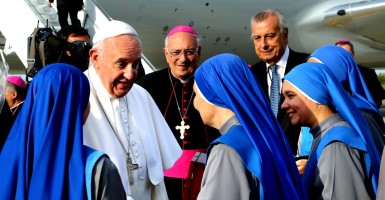Yesterday on his flight back to Rome, Pope Francis was asked if he supported government officials who cannot in good conscience issue marriage licenses to same-sex couples.
His answer: “Conscientious objection must enter into every juridical structure because it is a right.”
Although it is unclear if Francis had in mind the recent imprisonment and release of Kim Davis, the Rowan County, Ky., clerk who objected to issuing same-sex marriage licenses bearing her name and title, he clarified that the freedom of conscience applies to all persons, including government officials.
These final comments capped a week of statements and actions by the pope addressing religious liberty.
Pope Francis set the tone upon arriving at the White House last week, where he explicitly joined the U.S. bishops’ call to defend religious liberty from all that would “threaten and compromise it”—addressing President Obama directly as he delivered those words.
This was followed by Francis’ highly symbolic visit to the Little Sisters of the Poor, the order of nuns that the Obama administration has threatened with devastating fines for refusing to cooperate in providing coverage for abortion-inducing drugs and contraception in their employee health plans, in violation of their religious conscience.
In his address to Congress, Francis pointed to Abraham Lincoln as America’s great defender of liberty and called for “safeguarding religious freedom, intellectual freedom, and individual freedoms.”
It was therefore fitting that the pope delivered a speech dedicated to religious liberty this past Saturday in front of Independence Hall, and from the same lectern used by Lincoln himself for the Gettysburg address.
Francis began by recalling America’s founding principles: “that all men and women are created equal, that they are endowed by their Creator with certain inalienable rights, and that governments exist to protect and defend those rights.” He warned that “history also shows that these or any truths must constantly be reaffirmed, re-appropriated, and defended.”
Although there has been a movement in America to reduce freedom of religion to freedom of worship, the pope responds that faith cannot be confined to Sunday services, because it is part of the fabric of people’s daily lives and daily interactions with others.
[Religious freedom] is a fundamental right which shapes the way we interact socially and personally with our neighbors whose religious views differ from our own. Religious freedom certainly means the right to worship God, individually and in community, as our consciences dictate. But religious liberty, by its nature, transcends places of worship and the private sphere of individuals and families. Our various religious traditions serve society primarily by the message they proclaim. . . . They call to conversion, reconciliation, concern for the future of society, self-sacrifice in the service of the common good, and compassion for those in need. At the heart of their spiritual mission is the proclamation of the truth and dignity of the human person and human rights.
Francis warned of “forms of modern tyranny” that seek to suppress religious freedom or to “try to reduce it to a subculture without right to a voice in the public square” but countered that a robust respect for religious voices furthers the defense of human dignity and the cause of peace.
The pope highlighted ways that the religious voice takes its place in the public square, from “caring for our neighbors in need” to “defending the dignity of God’s gift of life in all its stages” to “defending the cause of the poor and the immigrant,” despite frequently encountering “powerful resistance.”
And he concluded his speech with an exhortation for the American people neatly summarizing this key focus of his visit: “May you defend these rights, especially your religious freedom, for it has been given to you by God himself.”

























